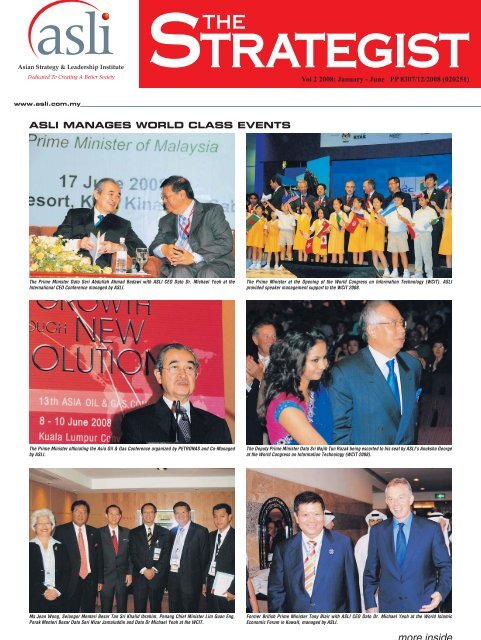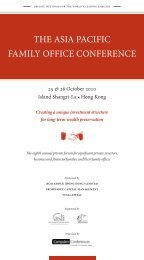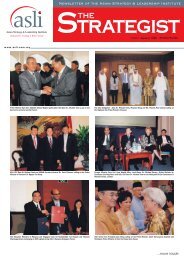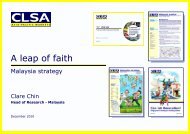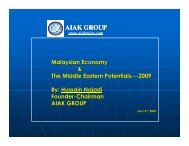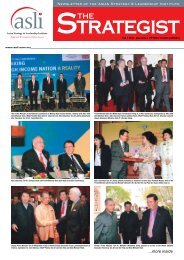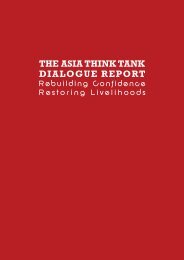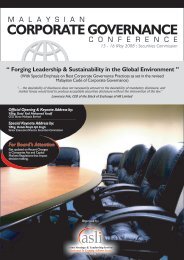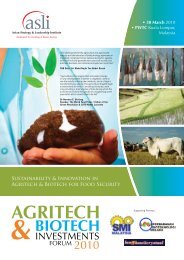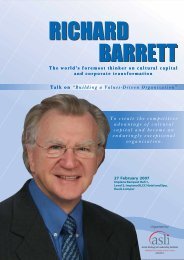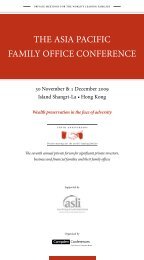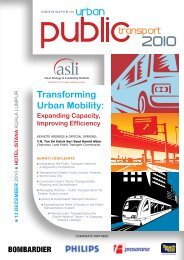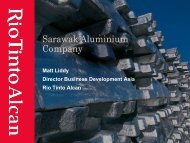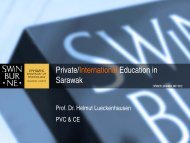asli manages world class events - Asian Strategy & Leadership ...
asli manages world class events - Asian Strategy & Leadership ...
asli manages world class events - Asian Strategy & Leadership ...
You also want an ePaper? Increase the reach of your titles
YUMPU automatically turns print PDFs into web optimized ePapers that Google loves.
ASLI MANAGES THE 2nd INTERNATIONAL CEO’SCONFERENCEDato Seri Abdullah Haji Ahmad Badawi, Prime Minister of Malaysia flanked by Datuk Seri Musa Haji Aman, ICC2008 Main Organising Committee Chairman and Sabah Chief Minister and Dato Dr Michael Yeoh, Co-Founder& CEO, ASLI during the Official Closing Ceremony.The Prime Minister receiving a memento after closing the ConferenceOn the stage : Tan Sri Nor Mohamed Yakcop, 2nd Finance Minister flanked by Datuk Seri Musa Haji Amanand Dato Dr Michael Yeoh.The 2nd International CEOs Conference 2008 held on 15-17 June 2008ended successfully where more than 600 delegates and role-playersfrom 33 countries gathered during the 2-day conference at The MagellanSutera Hotel.The conference kick started with a mini Golf Tournament held on Sunday,15 June 2008 at the Sutera Harbour Golf & Country Club. In the evening,delegates and guests were feted to a sumptuous Welcome Dinner with thetheme “An Evening in Sabah” at the Magellan Grand Ballroom. The Dinnermanaged to showcase Sabah’s rich, diverse and colourful potpourri ofculture and traditions. The cultural performers and musicians delightedthe audience with a 1 and 1/2 hour of solid, continuous and fast-pacedtraditional songs, music, dances and entertainment. The dances weretypically fast-paced with energetic movements and colourful costumesIn his Welcome Remarks during the Dinner, ICC 2008 Main OrganisingCommittee Chairman and Sabah Chief Minister, Datuk Seri Musa HajiAman invited foreign investors to tap into the vast economic potentialsin Sabah, a state that is rich in natural resources and has diverse naturalattractions, supported by a stable political environment. “Sabah providesan ideal climate for economic development as well as trade and investmentopportunities” he said. In persuading the international delegates to chooseSabah for their investments, he said the state had pragmatic policiesand strategies that not only guarantee long-term economic and politicalstability but also increase prosperity and the quality of life. He went on torecount several plus points for investing in Sabah that included not just itsstrategic location in the region and the many natural wonders of the state,Datuk Seri Musa Haji Aman, ICC 2008 Main Organising Committee Chairman and Sabah Chief Minister,presenting a special memento to Tan Sri Nor Mohamed Yakcop, 2nd Finance Minister (on behalf of The Hon.Dato Sri Mohd Najib Tun Haji Abdul Razak) whilst Dato Dr Michael Yeoh looks on.but also the prevailing peace and harmony in spite of the more than 32ethnic groups living in Sabah.Meanwhile, The Hon. Dato’ Sri Mohd Najib bin Tun Haji Abdul Razak,Deputy Prime Minister, in his Opening Keynote Address read by TheHon. Tan Sri Nor Mohamed Yakcop, Second Finance Minister, said thatthe global economic environment was expected to experience furtherliberalisation while uncertainties remain in the outlook of major economies.Success required renewed focus on building competitive niches integratedinto global economy. Therefore, it is necessary to seek partnerships andforge alliances between governments, global players and the society as thewhole to translate the benefits of globalisation so they reach everyone.During the Official Closing Ceremony on Tuesday, 17 June 2008, in hisClosing Keynote Address, The Hon. Dato’ Seri Abdullah Haji AhmadBadawi, Prime Minister of Malaysia, urged all Chief Executive Officers tobe prepared for all kind of unexpected risks in a <strong>world</strong> that is so closelyconnected. He further added that leadership should be viewed as aresponsibility and not a privilege. Leaders and CEOs can no longer reston their laurels and they must lead with humility, openness and a clearconscience.The conference was divided into 7 sessions with the topics: “Session 1:Globalisation and New Realities: How <strong>Asian</strong> Companies are Respondingto Them”, “Session 2: Is Globalisation the Panacea to the Problem ofWorld Peace & Harmony”, “Session 3: Globalisation Revisited - Its Impacton Mankind”, “Special Session: <strong>Asian</strong> Giants Awakened: China and IndiaThe Rt. Hon. Mike Moore, former New Zealand Prime Minister and Director General of World Trade Organization(WTO) listening attentively to Mrs. Irene M.Dorner, CEO & Deputy Chairman of HSBC Bank Malaysia Berhadduring Session 1 : Globalisation and New Realities : How <strong>Asian</strong> Companies are Responding to Them.ASLI Director Puan Sri Susan Cheah greeting Sabah Chief Minister Dato Seri Musa Aman.
ASLI MANAGES THE 2nd INTERNATIONAL CEO’SCONFERENCEDatuk Seri Musa Haji Aman, ICC 2008 Main Organising Committee Chairman and Sabah Chief Ministerwith some of the role-players participating at the 2nd International CEOs Conference 2008.Tan Sri Dato Seri Megat Najmuddin Khas, Prof Dr Dewi Fortuna Anwar and Datuk Nicholas S.Zefferysduring the Session 3 : Globalisation Revisited – Its Impact on Mankind.in the Making of the New Economic Superpowers”, “Session 4: ClimateChange & Ecological Sustainability: Honouring Mother Nature”, “SpecialSession: Facility .& Asset Management - Minimise & Control Costs, IncreaseCapacity & Sustainability” and “Session 5: Talent Management and HighPerforming Organisations: Driving Talent Mindset for Excellence”.There were also three parallel sessions under the Economic Roundtable,namely “Brand and Corporate Innovation & Competitiveness”,“Entrepreneurial Promise of Renewable Energy to Meet Energy Demand”and “Smart Partnership - Forging Successful Strategic Alliance”Some of the big names who gathered in Kota Kinabalu included TheRt. Hon. Mike Moore, former Prime Minister of New Zealand & Director-General, World Trade Organization (WTO), New Zealand; Dr EkwowSpio-Garbrah, Secretary-General Commonwealth TelecommunicationsOrganization (CTO) and Former Minister of Communications, Ghana;Tan Sri Dr Munir A. Majid, Chairman, Malaysia Airlines; Dato’ Saw ChooBoon, Country Chairman, Shell Malaysia; Mrs Irene M. Dorner, CEO &Deputy Chairman, HSBC Bank Malaysia Berhad; Dato’ Seri Ahmad ZubirMurshid, President & Group Chief Executive, Sime Darby Berhad; TanSri Dato’ Seri Megat Najmuddin Khas, Chairman, <strong>Asian</strong> Pac HoldingsBerhad; Prof Dr Dewi Fortuna Anwar, Deputy Chairman, Social Science& Humanities, The Indonesia Institute of Sciences; Mr Russell Teal,President and Founder, Biodiesel Industries, Inc., USA; Mr HermawanKartajaya, Founding Chairman & President, MarkPlus, Inc., Indonesia; MrIan C. Buchanan, Senior Executive Adviser & Former Regional Chairman,Booz Allen Hamilton; Ms Parvin Ali, OBE, CEO & Co-Founder, FatimaWomen’s Network, UK; Mr Leo Ariyanayakam, CEO & Group ExecutiveDirector, Scicom (MSC) Berhad; Mr David Jones, Chairman, EU-MalaysiaChamber of Commerce & Industry; Datin Yasmin Merican, Founder /Managing Principal & Director, Trax Associates Sdn. Bhd. and Mr BillyHarkin, CEO, QuocomHaps Holdings Ltd., UK, to name a few.As in the past, a mini exhibition was held alongside the conference. Thisconference offered a unique opportunity for companies, manufacturersand suppliers to showcase their products and services and reach decisionmakersand buyers in the region that fast becoming a huge profitablemarket.The conference had the full support of UEM Group Berhad, the MainPartner and corporate partners, namely, The New Straits Times, MalaysiaAirlines, Sutera Harbour Resort, Suria Capital Holdings Berhad, SabahPorts Authority, Shell Malaysia, TM Berhad, Borneo Eco Healing CentreSdn. Bhd., HSBC Bank Malaysia Berhad, Media Prima Berhad, NewSabah Times, Angkatan Hebat Sdn. Bhd., Fuji Xerox Asia Pacific Pte. Ltd.,Sawit Kinabalu Sdn. Bhd., Sabah Economic Development Corporation(SEDCO), Waterfront Urban Development Sdn, Bhd. (Kota Kinabalu CityWaterfront), Toyota Corporation and Acer sales & Services Sdn. Bhd.The conference was hosted and organised by the Sabah State Governmentthrough Yayasan Sabah Group and managed by the <strong>Asian</strong> <strong>Strategy</strong> &<strong>Leadership</strong> Institute (ASLI).Dato Richard Curtis and the panelists for Parallel Session 2 : Entrepreneurial Promise of RenewableEnergy to Meet Energy Demand, Dato Saw Choo Boon and Mr Bunn Nagara.Mr David Jones of EUMCCI joined by Mr Hermawan Kartajaya and Datin Yasmin Merican during theParallel Session 1 : Brand and Corporate Innovation & Competitiveness.Tan Sri Dr Munir A. Majid, Puan Sri Datin Seri (Dr) Susan S.C. Cheah, Dato Dr Michael Yeoh and MrLeo Ariyanayakam.Tan Sri Dr Munir A. Majid, Chairman of Malaysia Airlines presenting his deliberations during Session 2:Is Globalisation the Panacea to the Problem of World Peace & Harmony.
ASLI SUPPORTS WORLD CONGRESS ONINFORMATION TECHNOLOGY 2008 (WCIT 2008)Prime Minister Dato Seri Abdullah Ahmad Badawi, Science, Technology & Innovation Minister Datuk Dr.Maximus Ongkili, the President of WITSA and Energy, Water & Communications Minister Datuk Shaziman.The Deputy Prime Minister Dato Sri Mohd Najib Tun Razak closing the WCIT 2008.ASLI’s Vice President Mr Max Say with Johor Menteri Besar Dato Abdul Ghani Othman and Melaka ChiefMinister Dato Seri Mohd Ali Rustam.With the ambitious vision to catalyze global transformation by enablingbusinesses, empowering societies, and enriching economies, the World Congressof Information Technology 2008 (WCIT 2008) kick started its dynamic three-daycongress program themed Global Impact on ICT on 19 May at Kuala LumpurConvention Center. The <strong>Asian</strong> <strong>Strategy</strong> and <strong>Leadership</strong> Institute (ASLI) waspresent as part of its congress production and speakers’ management team.There was never a dull moment at the energetic WCIT 2008 with more than 3000delegates present, over 100 prominent speakers, and over 100,000 square feetof exhibition space filled with 50,000 visitors. Malaysia’s very own Prime MinisterDato’ Seri Abdullah Badawi officiated the WCIT 2008, accompanied by DatukDr Maximus Ongkili, Minister of Science, Technology and Innovation, Dato’Badlisham Ghazali, Chairman of WCIT 2008, and George Newstrom, Chairmanof WITSA.In his opening speech, Dato’ Seri Abdullah Badawi recognized the importanceof ICT in increasing efficiency and competitiveness of Malaysia as a whole. Heannounced that Malaysia’s national broadband initiative will be launched soonand by 2010, over 50% of Malaysians will have access to such services; thusmaking cheap and fast internet no longer a luxury, but an affordable necessity inMalaysia.Since WCIT is the flagship event of the World Information Technology andServices Alliance (WITSA), a consortium of 73 international ICT organizationswhose member comprise more than 90% of the global IT market; it was onlyfitting that Dr James Poisant, Secretary- General of WITSA set the tone of theconference with his keynote address entitled “Enabling the Renaissance of theDigital Age-A Call for Action”. He cited four critical issues that would be discussedand elaborated further throughout the WCIT 2008 conference: maximizing theefficient use of energy, the liberalization of the service sector, internet governance,and ICT technology and education.Bill Gates made a special appearance via holographic technology to discuss howthe advances in computing will continue to open up opportunities for everyone toacquire new skills and knowledge needed to drive local innovation. Ultimately, hePenang Chief Minister Lim Guan Eng with the ASLI Team.emphasized, ICT is a key foundation for sustainable innovation-based economies.Dato’ Dr Craig Barrett, Chairman of Intel spoke about education and the role of ICTin propelling accessibility to it. Dr Craig Venter, who was recently named one ofTime magazine’s 100 most influential people, shared the successes of the J.CraigVenter’s Institute in developing and commercializing genomic-driven solutionsto address global energy & environmental challenges. By marrying computerscience and molecular biology, the institute has successfully stitched together 582970 chemicals to recreate a DNA bacterium and are now seeking to patent the firstman-made life form, possibly naming it Mycoplasma Laboratium. Dr Vinton Cerf,Chief Internet Evangelist, Google Inc, also known as the “Father of the Internet”highlighted the importance of the Internet in today’s society, especially since itis the easiest and cheapest means of communication: “Although mankind cansurvive without the net, it will be a long struggle…”. Dr Cerf emphasized as weexperience the effects of climate change, and oil and water shortage, industrieswill begin to rely more on ICT to not only replace physical transportation, but alsofor energy production.The congress also had several ministerial and plenary panels to discuss whyand how digital transformation should be the principal goal of nations’ economicpolicies. The panels concurred that the government should be an enabler, nota participant in the ICT business and should have tax incentives to spur digitaltransformation. The ministers speaking were Datuk Dr Maximus Ongkili, Ministerof Science, Technology and Innovation, Malaysia; H.E. Dr Liwayway Vinzons-Chato, Member of the House of Representatives, The Philippines; H.E. Dr LeeBoon Yang, Minister for Information, Communications and the Arts, Singapore;and Sergio Carrera Rivapalacio, General Director, Digital Economy; H.E. A.Raja,Minister of Communications; and Information Technology, India and Commerce,Ministry of Economy, Mexico.At the closing ceremony, Deputy Prime Minister Dato’ Sri Mohd Najib TunAbdul Razak delivered his keynote address. Dato’ Sri Mohd Najib congratulatedall parties who have made this “Olympics of ICT <strong>world</strong>” a success, attractingUS$2.6bil (RM8.3bil) in investments in the three day period and had identifiedRM1bil in business opportunities after 800 meetings in the last three days. Thiscongress has “put Malaysia on the <strong>world</strong> technical map”.Dato Dr. Michael Yeoh greeting Prof William Miller, Professor Emeritus and former Provost of StanfordUniversity, USA.Chairman of INTEL Dr. Craig Barrett addressing the Conference.
ASLI MANAGES WORLD ISLAMIC ECONOMIC FORUMPrime Minister Dato Seri Abdullah Ahmad Badawi being greeted by ASLI CEO Dato Dr Michael Yeoh onhis arrival for the WIEF in Kuwait.The Emir of Kuwait and other Heads of State and Governments at the 4th World Islamic Economic Forumhosted by the Government of Kuwait and managed by ASLI.President Hamid Karzai of Afghanistan and King Abdullah of Jordan.The World Islamic Economic Forum was conceptualized and foundedby ASLI in 2005 after ASLI had successfully organized the 1st and2nd OIC Business Forum. The 4th WIEF was held in Kuwait, hostedby the Government of Kuwait. ASLI was the Event Manager for theForum held in Kuwait. A distinguished panel of speakers who includedHead of States and Governments and top business leaders attendedthe Forum.The Opening of the 4th World Islamic Economic Forum was officiatedby the Emir of Kuwait. During the Opening Ceremony, the Emirannounced that Kuwait will launch a US100 mill fund to increase foodproduction. The Emir also called for closer cooperation among Islamiccountries. The Opening Session was also addressed by King Abdullahof Jordan, President Wade of Senegal who is the new Chairman of OICand President Hamid Karzai of Afghanistan.King Abdullah stressed the need to increase efforts to promoteeconomic cooperation and the huge role of economic alliances foreconomic success. He also emphasized the need to create a greeneconomy and economic sustainability in Islamic countries. He lamentedthe perennial shortage of skilled manpower in Islamic countries. TheKing spoke about the importance of knowledge, cooperation and coexistenceand stressed that “hope not anger” will restore the greatIslamic traditions.The Prime Ministers of Bahrain and Kuwait at the WIEF.The President of Senegal spoke of the importance of generatingemployment and eradicating poverty as well as the importance of itsagriculture sector. President Hamid Karzai emphasized the need to focuson scientific education and to ensure women participation in the economyand the workplace. He also reminded Muslims to “fight the enemy within”.The Prime Ministers of Kuwait, Bosnia-Herzovogina, Ivory Coast andBahrain also spoke during the <strong>Leadership</strong> Panel. They shared theirperspectives on fighting corruption, improving accountability andtransparency and the need for reforms. The President of the IslamicDevelopment Bank Dr. Ahmed Mohamed Ali also addressed the Forum.The former Prime Minister of Britain, Tony Blair in his address to the Forumsaid, the Islamic <strong>world</strong> has more funds than the IMF and World Bank puttogether. He stressed the vital importance of economic interdependenceand the need to work together. Mr. Blair said the rest of the <strong>world</strong> needsMuslims economically and culturally and need to seek common ground.He reiterated the need for public sector reforms, to keep economies open,manage existing wealth and invest in the future. Former Australian PrimeMinister Bob Hawke also addressed the Forum.The Prime Minister of Malaysia Dato Seri Abdullah Ahmad Badawi whois Patron of the World Islamic Economic Forum Foundation delivered theClosing Keynote Address at the forum.Khazanah Nasional’s Managing Director, Tan Sri Azman Mokhtar at the Forum.Former Australian Prime Minister Bob Hawke and Brunei Economic Development Board Chairman DatukPaduka Timothy Ong.
ASLI CO-MANAGES13th ASIA OIL & GAS CONFERENCE 2008Dato Seri Abdullah Haji Ahmad Badawi, Prime Minister of Malaysia accompanied by Tan Sri Dato SriMohd Hassan Marican during arrival at the KL Convention Centre for the Official Opening Ceremony.Tan Sri Dato Sri Mohd Hassan Marican, Chairman of the Advisory Panel of AOGC 2008 delivering hisWelcome Address.State-of-the-Industry Address by Dr Tony Hayward, Group Chief Executive, BP plc, UK.Prime Minister, The Hon. Dato’ Seri Abdullah bin Haji Ahmad Badawi officiallylaunched the recent 13th Asia Oil & Gas Conference on Monday, 9 June 2008. Theconference, aptly themed “Growth through New Solutions” was held from 8-10 June2008 at the Kuala Lumpur Convention Centre.Over the years, the AOGC has evolved into an important annual forum for some ofthe big names in the oil & gas fraternity to gather in KL to plan on how they couldstrategically and effectively position themselves in the wake of daunting challenges.This high-powered conference was geared towards high-level interchange of viewson current experiences, knowledge, expertise and view among industry players,major national oil companies, policy-makers, traders, suppliers, eminent speakers,industry experts, government officials and fellow professionals from all over the<strong>world</strong> focusing on common and strategic, current and emerging key issues facedby the oil & gas industry. The conference attracted more than 1,300 delegatesincluding Advisory Panel Members, Members of Committee, role-players, sponsors,exhibitors and media representatives from over 40 countries.Earlier during the Official Opening Ceremony, Tan Sri Dato’ Sri Mohd HassanMarican, Chairman of the Advisory Panel, AOGC 2008 and President / CEO ofPETRONAS delivered his Welcoming Address. In his Address, Tan Sri highlightedthat the oil and gas industry is at the critical juncture that called for innovativeand bold solutions. He further reiterated that new models of cooperation andcollaboration will be needed between the producers and consumers as well asbetween lOCs, NOCs and service companies to achieve real progress. Efforts mustalso be focused on supporting the formulation of sound energy policy, intensifyingR&D efforts and addressing industry-wide capacity and capability shortages.The Hon, Dato’ Seri Abdullah bin Haji Ahmad Badawi in his Keynote Address alsoreminded the delegates that the global energy industry is currently faced with a“Gordian Knot” that can only be unraveled through the use of bold and innovativesolutions. He also commended PETRONAS for successfully convening the 13thedition in the AOGC Series which served as the stepping stone towards thediscovery of the novel and bold solutions.Mr Mirzan Mahathir, President of ASLI joined by Tan Sri Dato Mohd Sheriff Mohd Kassim, Chairman ofthe Board of Trustees, MIER and Tan Sri Leo Moggie.Two days of intensive deliberations and exchanges of views concluded on Tuesday,10 June 2008 with the wrapping-up of the conference by the Conference Chairman,Dr Fereidun Fesharaki, Chairman & CEO, FACTS Global Energy Group, USAAmong those presented at the conference were Dr Tony Hayward, Group ChiefExecutive, BP plc, UK; Prof Kjell Aleklett, Uppsala Hydrocarbon Depletion StudyGroup, Sweden; Mr James A. Slutz, Acting Principal Deputy Assistant Secretary,US Department of Energy; Mr J. Robinson West, Chairman, PFC Energy, USA;Dr Jeffrey Currie, MD & Head on Global Commodities Research, Goldman SachsInternational, UK; Prof Kishore Mahbubani, Dean and Professor in the Practice ofPublic Policy, National University of Singapore; Mr R.S. Sharma, Chairman & MD,Oil & Natural Gas Co. Ltd., India; Mr Andrew P. Swiger, President, ExxonMobilGas & Power Marketing Company, USA; and Mr Darcel Hulse, President & CEO,Sempra LNG, USA; David Morrison, to name a few.The conference garnered strong support and generous contributions from BPExxonMobil Subsidiaries in Malaysia, Mitsubishi Corporation, Murphy, ShellMalaysia, ConocoPhillips, Dell, Nippon Oil, Scomi Group Berhad, SingaporePetroleum Company, Talisman Energy, Malaysian Maritime Academy or AkademiLaut Malaysia (ALAM), BMW Malaysia, Maxis Communications Berhad, NewfieldPeninsula Malaysia Inc., PetroVietnam, and SapuraCrest Petroleum Berhad. Othersponsors include Media Sponsors – Argus Media, PetroMin / Hydrocarbon Asia/ PetroMin Pipeliner, Marketing Sponsors – Asia Inc., F & L Asia, Middle EastEconomic Survey (MEES), Thomson Reuters and Upstream, and Media Partner- CNBC.The 13th conference was managed and organised by Petroleum Nasional Berhad(PETRONAS) and co-managed by the <strong>Asian</strong> <strong>Strategy</strong> & <strong>Leadership</strong> Institute (ASLI),the Conference Connection, Inc., Malaysian Institute of Economic Research (MIER)and PFC Energy, USA.Mr Mirzan Mahathir having a chat with HE Lody Embrechts, the Netherlands Ambassador and Tan SriRainer Althoff, President and CEO, Siemens Malaysia.Prof Kishore Mahbubani, Dean and Professor in the Practice of Public Policy, Lee Kuan Yew School ofPublic Policy, National University of Singapore at the Official Opening Ceremony of the 13th Asia Oil &Gas Conference 2008.
5th ASEAN LEADERSHIP FORUM 2008Singapore’s Minister of State for Trade & Industry Mr Lee Yi Shyan and ASLI CEO Dato Dr. MichaelYeoh.Mr Tan Keng Jin of ISEAS, former ASEAN Secretary General Rodolfo Severino, Ambassador KesavapanyDirector of ISEAS, ASEAN Secretary General Dr. Surin Pitsuwan and Dato Dr. Michael Yeoh.Chairman ASEAN Business Advisory Council Dr. Arun Jira, Dato Dr. Michael Yeoh, Dr. Surin Pitsuwanand President ASEAN Business Forum Dr. Jannie Tay.On June 18, 2008 at the Shangri-La Hotel Singapore, The Institute of Southeast<strong>Asian</strong> Studies (ISEAS) together with the <strong>Asian</strong> <strong>Strategy</strong> & <strong>Leadership</strong> Institute andin association with the ASEAN Secretariat organised the 5th ASEAN <strong>Leadership</strong>Forum 2008 with the theme “In the Wake of the ASEAN Charter”.The ALF has always been a venue of prime movers and opinion leaders in theASEAN region to seek fresh insights, exploring new ideas and providing a timelyplatform to evaluate the driving forces defining ASEAN cooperation and integration.This year at the 5th ASEAN <strong>Leadership</strong> Forum which managed to attract over160 participants from all over ASEAN region, brought together leaders, keystakeholders- government, business, civil society and academia to tackle the keyleadership challenges facing ASEAN. Singapore was chosen to host the 5th ALFbeing the current Chair of the ASEAN Standing Committee.ASEAN is gaining international credibility following the signing of the ASEANCharter last November in Singapore. The signing of this charter demonstratedthe commitment to ASEAN integration and enhanced linkages in the economic,political and social areas as was stated by Singapore’s Minister of State for Tradeand Industry, Mr Lee Yi Shyan, during his Keynote Address. In his remarks MrLee said that ASEAN must work as a cohesive body and integrate so that theorganisation could provide member countries with the ability to respond to externalchallenges with greater resilience and unity. As the spiraling oil and food prices,global warming and the threats of terrorism are among the issues, ASEANintegration is even more imperative now than ever as member countries needed astrong and an institutionalized body in ASEAN to cope with the many challenges tocome. Mr Lee concluded that the collective journey forward is not a straight path,but it is also not an impossible task if we apply our minds to it.H.E. Dr Surin Pitsuwan, ASEAN Secretary-General in his Special Address statedthat it is now the time for ASEAN to be taken seriously. He cited the appointmentsThe ASEAN Secretary General with Mr Karl Peter Schoenfisch of Hanns Siedel Foundaton.of a United States ambassador to ASEAN last April as evidence that the <strong>world</strong> istaking ASEAN more seriously now. ASEAN credibility was also enhanced by itskey role in helping survivors of the devastating cyclone Nargis that hit Myanmar lastmonth. The incident has boosted confidence in ASEAN’s competence and ability to“rise to the occasion”. Nevertheless, as stated by Dr Surin there is still much work tobe done especially to ensure that the group meet the target deadline for economicintegration which was committed by members to form a common market blueprintcalled the ASEAN Economic Community by 2015.Among the distinguished speakers who addressed the ASEAN <strong>Leadership</strong> Forumwere the Chairman of the ASEAN Business Advisory Council Dr. Arun Jira, theChairman of Asia Inc and Acting Chairman Brunei Economic Development BoardDato’ Paduka Timothy Ong, the President of the ASEAN Business Forum andDeputy Chairman of the Hour Glass Singapore Dr. Jannie Tay, the CEO of AirAsiaX Mr. Azran Osman Rani, the former ASEAN Secretary General Dr. RodolfoSeverino, the President of the <strong>Asian</strong> Development Bank Institute Dr. MasahiroKawai, Dr. Rajah Kumar, CEO of Philips Group of Companies, Malaysia, Dr.Raymond Atje of the CSIS Jakarta and Mr. Lim Neo Chian, CEO of SingaporeTourism Board.The Forum discussed what the ASEAN community means for the businesscommunity and how to unleash the ASEAN community’s potential? Other topicsinclude the CEO Watch List - What Can Go Wrong in East Asia, Selling ASEAN tothe World and East <strong>Asian</strong> Regionalism - Where do we go next with the East AsiaSummit?Mr. Karim Raslan, Group CEO, KRA Malaysia gave a Luncheon Talk on “MalaysiaAfter March 8”.Some speakers at the Forum.ASLI Vice President Max Say with CEO of AirAsia X Azran Othman Rani.
THE 10th MALAYSIA STRATEGIC OUTLOOKCONFERENCE 2008ASLI Director Tan Sri Navaratnam presenting a memento to Tan Sri Rafidah Aziz.ASLI CEO Dato Dr. Michael Yeoh presenting a memento to Tan Sri Muhyiddin Yassin for addressing theConference.Ambassadors at the Conference.The 10th Malaysia Strategic Outlook Conference 2008 was held on the 24thof January 2008. The conference was organised by the <strong>Asian</strong> <strong>Strategy</strong> &<strong>Leadership</strong> Institute (ASLI) and is a premier Annual Series looking analyticallyat the state-of-the-Malaysian economy. Themed as “The Malaysian Economy2008: Trends, Challenges, Strategies, Opportunities”, the conference provideda timely opportunity to assess the economic outlook of Malaysia and the likelyperformance of the key sectors driving the economy. Ultimately, the Conferencewas aimed at providing illuminating and insightful views and opinions on strategyand the economy and set the tone for the 2008 Malaysian economy.Opening CeremonyDato’ Dr. Michael Yeoh, Chief Executive Officer of the <strong>Asian</strong> <strong>Strategy</strong> & <strong>Leadership</strong>Institute, gave his welcoming remarks, and explained that the conference providesa timely assessment of the economy, highlighting key issues and provides ahealthy environment for the speakers to interact. He then briefly illustrated whatwas to be expected of the nation’s economy and announced that Malaysia’s GDPwould grow at 6.2% this year according to ASLI forecasts. He underlined factorsthat would contribute to this growth.Tan Sri Rafidah Aziz, the then Minister of International Trade and Industry, gavethe keynote address and officially opened the Conference. She spoke on recentglobal <strong>events</strong> and their effect on the nation’s economy. She also stated thatfrom the past economy crisis, Malaysia has learnt valuable lessons and will beprepared. Details on the 3rd Industrial Plan were also disclosed; where it’s strongfoundation lies in Malaysia’s 3 economic pillars: the services, manufacturing, andagriculture sectors.Tan Sri Rafidah Aziz then launched ASLI’s “Profiles of Excellence” Publication.SESSION 1 : Malaysia’s Economic Outlook & Challenges - What’s DrivingGrowth?Moderator : Tan Sri Dato’ Dr. Ramon V Navaratnam, Chairman, Centre forPublic Policy Studies, ASLIDato’ Dr. Gan Khuan Poh, President of the Malaysian Economic Associationspoke on the overview of the economy in 2007 and the current economicenvironment where factors such as stable interest rates, a strong BalanceTan Sri Rafidah Aziz unveiled a new ASLI Publication after opening the Conference.of Payment, where the Current Account is in surplus and improved investorconfidence have been very beneficial to the national economy. Dr. Gan thenhighlighted key aspects of the outlook for the 2008 Malaysian Economy,naming various factors that will have significant impacts on the Malaysia andits economy, such as the Iskandar Development Region (IDR), the NorthernCorridor Economic Region (NCER), strong hedge funds in the oil marketand the current economic situation in the United States. He concluded byemphasising that the resilience of the economy depends heavily on the abilityto decouple from the troubles in the US and European financial systems.Dato’ Ikmal Hijaz Hashim, Chief Executive Officer, Iskandar Regional DevelopmentAuthority (IRDA) gave a comprehensive look at what is to be expected of theIskandar region and of the phases of its implementation. He also spoke on thedifferences between the Iskandar region, the Northern Corridor Economic Region(NCER) and the Eastern Corridor Economic Region (ECER). Nation building is theagenda behind this massive project.SESSION 2 : Regional Prospects - Where are the Opportunities in theRegion? What Are the Risks? What Can Go Wrong? What should be on OurRadar Screen?Moderator : Prof. Dr. Lee Poh Ping, Principal Fellow, Institute of Malaysian andInternational Studies (IKMAS), National University of Malaysia.Dr. Wong Yit Fan, Chief Executive Officer for Vietnam and IndoChina, DBS BankLtd highlighted the current situation of the global economy and of factors thatwould have large effects on it in the near future. He gave a detailed analysis on theimpact of holding real interest rates at unreasonably low levels. He also said thatglobal inflation to be higher than it’s supposed to be.Dr. Ooi Kee Beng, Fellow, Institute for South East <strong>Asian</strong> Studies, Singapore(ISEAS) emphasised on short term & long term (conceptual challenges) issues.In the short term, things are not bad for ASEAN. It has the small guy’s advantage,having flexibility on its side and that the big guy will always need the small guy. Inthe long term however, ASEAN is way behind, especially in terms of infrastructure.China will be more integrated. He also spoke on ASEAN’s convergence in PoliticalThought and of a need for Southeast <strong>Asian</strong> voices and faces.Mr Wong Jit Fan, Prof Lee Poh Ping, Dr. Ooi Kee Beng and ISIS Director General Prof Dr. Mahani ZainalAbidin.Malaysian Economic Association President Datuk Dr. Gan Khuan Poh, Tan Sri Ramon Navaratnam andIskandar Regional Development Authority’s CEO Dato Ikmal Hijaz Hashim.
ASLI HOSTS HIGH LEVEL CHINESE DELEGATIONThe Vice Minister of the Organization Department of the Chinese Communist Party and the Ambassadorof China calling on the ASLI CEO.The Vice President of the Chinese Academy of Social Sciences visiting ASLI. Also present were Mr TanKoon Swan, Tan Sri Michael Chen and Datuk David Chua.The Chinese Vice Minister and his visiting delegation with the Ambassador of China at ASLI.The High-Level delegation from the Chinese Academy of Social Sciences visiting ASLI.THE 10th MALAYSIA STRATEGIC OUTLOOK CONFERENCE 2008 (cont.)Dr. Nungsari of Khazanah Nasional Berhad, Datuk Nicholas Zefferys, Mr Ou Shian Wei CEO of IBM Malaysia.Prof Dr. Mahani Zainal Abidin, Director-General, Institute of Strategic andInternational Studies (ISIS) Malaysia gave a talk focusing on the growinginterdependence of East Asia, regional integration and prospects for ASEAN andspoke on medium term issues, linking them with outlook for the year. Detailedexplanation was given on the how the East <strong>Asian</strong> countries will effect ASEAN andits dependence on ASEAN.Special Luncheon Keynote Address - “Strategic Outlook for AgricultureSector”Tan Sri Dato’ Seri Hj. Muhyiddin b. Hj. Mohd Yassin, the then Minister of Agricultureand Agro-Based Industry, gave the Special Keynote Address. He began byintroducing the key issues, challenges and prospects of the Agro-food sector. Theagriculture sector is a key component of national economic growth. The factorsthat are driving the sector include high prices of food products such as sugar andrice, high petroleum prices that are encouraging the production of bio fuels andhigh incomes, resulting in a sustained high demand for food items. He emphasisedthe importance of the agro-food sector and of its need to be reengineered towardsmaking Malaysia a centre for food production and Agro based products.SESSION 3: The Corporate Agenda - What’s driving tomorrow’s business?What are the New Corporate Challenges?Moderator : Datuk Nicholas S. Zefferys, President and Chief Executive Officer ofApplied Consulting & Engineering Sdn. Bhd.Mr. Ou Shian Waei, Managing Director of IBM Malaysia, shared his view on howglobal integration is resulting in more complexity. Globalization has arrived andhas connected 1.2 billion persons, he stated. IBM is looking beyond the level ofa multinational and is spreading its activities where it makes the most sense. Toachieve global leadership he noted that IBM looks at 3 key factors, which areEconomics, Expertise and Openness. Innovation is the way to sustainable growth;IBM holds innovation jams and provides staff the opportunity to work in a regionwhere they have special interest. He also addresses the changes of HumanResource requirements. He stressed that adaptability and leaders who can betrusted are of the utmost importance.Some speakers at the Conference.Dr Nungsari Ahmad Radhi, Executive Director of Khazanah Nasional, focused onthe investor perspective. He addressed three questions, what are the megatrends,what are their issues and what can firms do about these issues? There are threeclusters of megatrends, and these are Concentration, Connectedness andMobility, he noted. Arising from these megatrends there are two issues namely;defining boundaries of corporate responsibility and the rise of commodities. Tocounter these issues organizations have to reorganize in order to be able to retainand attract new talent.SESSION 4: Industry and Sectoral Trends - What are the Key Financial,Commodities, Petroleum and Commodities Trends? Where is the MarketHeaded for These Key Sectors?Moderator : Datuk R. Karunakaran, Director General Malaysian IndustrialDevelopment Authority (MIDA).Mr. Vincent Leusner, President of the American Malaysian Chamber of Commerce(AMCHAM), underlined the importance of the Malaysian Market to the UnitedStates. He applauded the pro-business atmosphere in Malaysia. However, ForeignDirect Investment is on the downturn and Malaysia is laddered with countries suchas Indonesia.Dato’ Sabri Ahmad, Chairman of Malaysian Palm Oil Board, noted that the sectorneeds more Greenfield investment to remain sustainable. To improve harvest,research is being conducted in the genome system. Today sustainability hasbecome a major issue, and Malaysia is committed to addressing this issue with itscontinual focus on the Palm Oil industry.Mr. David Jones, Chairman of the European Union Malaysian Chamber ofCommerce and Industry, gave a brief introduction to EU-MCCI. In order forMalaysia to move up the value chain he stressed it has to give more importanceto the level of competitiveness within Malaysia. Indicators were then shown to theparticipants, reflecting Malaysia’s relative competitiveness levels and the ease ofdoing business in Malaysia.
1st MALAYSIAN CONSTRUCTION SUMMIT 2008Domestic Trade & Consumer Affairs Minister Dato Shahrir Abdul Samad receiving a memento afterOpening the Summit.Telekom Malaysia Chairman Tan Sri Radzi Mansor greeting Dato Shahrir Abdul Samad.IJM Group CEO Dato Krishnan Tan moderating a session.Tan Sri Ramon Navaratnam with EPU Deputy DG Dato Dr Govindan and REHDA President Dato Ng Seing Liong.On Tuesday, 3 June 2008, <strong>Asian</strong> <strong>Strategy</strong> & <strong>Leadership</strong> Institute (ASLI)and Master Builders Association Malaysia (MBAM) hosted the 1stMalaysian Construction Summit 2008 at the Putra World Trade Centre(PWTC). The underlying theme of the inaugural summit was “AddressingSupply Chain Bottlenecks for Sustainability”. The summit was organisedto explore some of the key issues that our construction industry is facingtoday. One of the primary objectives of this summit was to addressthe dire need for a high-level strategic platform that brings togetherrepresentatives from the government and industry stakeholders, investorsand regulators to interact, debate and brainstorm in transforming supplychain into a competitive advantage.The Opening Keynote Address was delivered by Dato’ Shahrir bin AbdulSamad, Minister of Domestic Trade & Consumer Affairs (KPDNHEP)whilst the Closing Address & The Way Forward was delivered by Tan SriDato’ Ir. Jamilus Hussein, Chairman, Construction Industry DevelopmentBoard (CIDB).During the Official Opening, Dato’ Shahrir gave a Keynote Address thatacknowledged that both the Ministry and the rest of the government wereaware of the many hardships that the industry has been facing in recentyears. He further admitted that many price controls and monopolisticpractices that had been in place previously were no longer appropriatein the present global economic environment. He also signaled to all inattendance of the government’s intention to work towards full liberalisationand reform of its outdated economic policies.This was followed by several sessions including “Overview of the MalaysianConstruction Industry - Present & Future Outlooks”, “Addressing HumanCapital Issues - Manpower Competencies, Shortages & Brain Drain”and “Resolving Building Material Issues - Price Escalation & SupplyBottlenecks”Summit role-players, included among others, Tan Sri Dato’ Dr RamonV. Navaratnam, Group Corporate Advisor, The Sunway Group, Datuk Ir.Hamzah bin Hasan, Chief Executive, Construction Industry DevelopmentBoard (CIDB), Dato’ Dr K. Govindan, Deputy Director-General II,Economic Planning Unit (EPU), Dato’ Mohd Zain Mohd Don, Secretary-General, Ministry of Domestic Trade & Consumer Affairs (KPDNHEP),Datuk Ng Seing Liong, JP, President, Real Estate & Housing Developers’Association (REHDA), Senator Datuk Haji Roslan Awang Chik, President,Malay Contractors’ Association (PKMM), Mr Patrick Wong, President,Master Builders Association Malaysia (MBAM), Dato’ Krishnan Tan,CEO & Group MD, IJM Corporation Berhad, Dr Ramli bin Hasan, DeputySecretary-General (Development), Ministry of Higher Education, DatukIr. (Dr) Haji Ahmad Zaidee Laidin, Past President & Council Member, TheInstitution of Engineers Malaysia (IEM), Ar. Dr Tan Loke Mun, ImmediatePast President, Malaysian Institute of Architects (PAM), Mr Kwan Foh-Kwai, Vice President, Master Builders Association Malaysia (MBAM),Dato’ Kamaruddin Ismail, Senior Director, Sectoral Policy & IndustrialService Division, Ministry of International Trade & Industry (MITI), Dato’Teo Chiang Kok, Patron, Real Estate & Housing Developers’ Association(REHDA) and Mr Chris Landry, President, National ReadyMix ConcreteAssociation of Malaysia (NRMCA).This summit garnered strong support from the Construction IndustryDevelopment Board (CIDB) as well as other endorsing organisations,namely, Real Estate & Housing Developers’ Association (REHDA),Malaysian Institute of Architects (PAM), The Institution of EngineersMalaysia (IEM), The Institution of Surveyors Malaysia (ISM), TheChartered Institute of Building (CIOB), Malaysian Institute of Planners(MIP), Association of Consulting Engineers Malaysia (ACEM), MalayContractors’ Association (PKMM) and Persatuan Kontraktor IndiaMalaysia (PKIM).Dato Teo Chiang Kok speaking at the Summit.The Organising Chairman Mr Kwan presenting a memento to CIDB Chairman Tan Sri Jamilus
MID-TERM REVIEW OF THENINTH MALAYSIA PLAN OPEN FORUMTun Dr. Lim Keng Yaik with Dato Seri Effendi Norwawi.MIC President Dato Seri S. Samy Vellu arriving at the Forum.DAP Member of Parliament Tony Pua addressing the Forum whilst INSAP Director Fui K. Soong andGABEM Executive Director Dato Mohd Dahan look on.Inequality of income distribution as measured through the Gini coefficient has beengoing down since 2007, said Prof. Dr. Ragayah Haji Mat Zin at the Mid-Term Review(MTR) of the 9th Malaysia Plan (9MP) held at Wawasan Open University on the 24thof April 2008. The event was hosted by the Centre for Public Policy Studies (CPPS)together with Wawasan Open University.However policies do have to look into how inequality has widened among the Malays,and one plausible example would be through the privatization of projects in favour ofthe Bumiputera, said Prof. Dr. Ragayah, the principal research fellow of the Institute ofMalaysian and International Studies (IKMAS), at the National University of Malaysia.The manufacturing target for the 9MP is a 6.7% growth rate. While the 8MP manufacturinggrowth had a 4.1% growth rate. In 2006 it rose to 7.3% and plunged to 3.1% growth ratein 2007. The projected growth rate for 2008 now stands at 3.1%. Such a shift in numbersover 3-4 years has to mean a drastic change in the manufacturing of products and rawmaterials and the ease it takes to be wiped out of the industry. Then what would be theoutcome for such industries and its players?The oil and gas sector contributes to 46.8% of the 2007 government revenue. Whenthe oil reserves deplete in 18 years, where would the government revenue then comefrom? Would the government be able to diversify into palm oil or other forms of energyconsumption? The public sector spending comprising of consumption & fixed investmentsin Malaysia in 2006 was a whopping 24% of the GDP, while the government’s spendinghas increased by 177% in 10 years, stated Tony Pua, of the DAP, Member of Parliamentof Petaling Jaya Utara. This shows that our economy is very much a consumer drivensociety, encouraging the expenditure of Malaysians to boost the economy. But this startto become a weak link in the long run, as relying on people to spend money will notalways be a good gauge to boost the economy.In the room of about 90 people, there was a general consensus of wanting the attitudesand mentalities of our Malaysian politicians to change for the betterment of Malaysiansociety. The Forum very carefully addressed three out of the five thrusts from the 9MP.The first thrust centred on moving the economy up the value chain, while the secondthrust addressed the persistent socio-economic inequalities and the third thrust was tofind means to strengthen the institutional and implementation capacity.From East Malaysia, Datuk Tham Nyip Shen and Datuk Wilfred Tangau from thepolitical parties of the Sabah Progressive Party (SAPP) and the United PasokmomogunKadazandusun Murut Organisation (UPKO) respectively in Sabah, shared on theeconomic situation in Sabah and the follow up measures of measuring performanceof the 9MP.Basic education and healthcare is in dire straits in Sabah. Datuk Tham emphasizedthe growing number of illegal immigrants, increasing the once quiet Sabah which had apopulation of 653.6 thousand in 1970 and in 2005, the population had risen to 3015.2Keadilan Member of Parliament Sivarasa Rasiah and UPKO Secretary General Datuk Madius Tangau.thousand, of which 24.8% are non-citizens. Many of these non-citizens are from theMindanao Island of the Philippines, China and Kalimantan. From the census conductedin 2000, Sabah had the lowest literacy rate for 15-24 year olds, hitting 88%, while thenational average is about 95% and above. Datuk Tham highlighted that literacy rate hasnot improved as many children from the 24.8% of non-citizens are not allowed to enterschool as they do not possess a birth certificate. In 2004, the per capita GDP in Sabahwas RM 4,868 as compared to the per capita GDP of Selangor at RM 11,978. And ahuge 51.3% of Selangor’s GDP was in the manufacturing industry, while Sabah onlycontributed 10.3% manufacturing to the GDP.Datuk Tangau talked on proper decision making and participation in the planningprocess. Firstly it includes the identification of needs, secondly there’s the approvalneeded from the bodies involved and thirdly, there’s the fulfillment of needs andlastly there’s the monitoring and evaluation of the impact. Yet in the process, how isperformance measured? That would be Achilles heel of the process that needs to becarefully watched. Monitoring and evaluation will be done by executive bodies too. Thedelivery system too has to be equally improved to the rural and urban areas in Sabah.The special address by Tun Dr Lim Keng Yaik tackled the message of social justice to beensured for all Malaysians. With income inequalities widening in the Malay community,subsidies are enjoyed more by the upper income brackets and not by those who needthe subsidies. Low income families living in urban areas are not able to subsist over theincrease in food and petrol prices. These people are not in extreme poverty but relativepoverty becomes their disability - they are ‘miskin hati’, translated to be poor in heart andspirit due to the insufficient help coming in their direction.One of the issues Dato’ Seri Effendi Norwawi dealt with was how successfullyMalaysia deals with its human capital and how it handles competitiveness in economicrestructuring. Malaysia ranks relatively low compared to countries like Singapore, HongKong and Taiwan on economic competitiveness. Similar points were raised by Dato’ DrLim, Sivarasa Rasiah, the Subang PKR MP and Datuk Tangau on meritocracy. Thisdoes not necessarily relate to the field of education alone but through the choices ofpolitical players to improve policy through governmental ministries, non-governmentalorganizations and local community. Merit needs to become a culture of choice and notbased on political affiliations alone.Ms Fui K. Soong, director of the Institute of Strategic Analysis and Policy Initiatives,ended her presentation on taking charge. Some questions were raised as to which bodyis now in charge of executing the 9th Malaysia Plan, in light of recent changes. Thereis a need to clarify this, since there may be confusion amongst Governmental bodies,Parliament, Non-Governmental organizations, State Institutions, and others.Datuk Denison Jayasooria closed the open forum with a summary of the day’sproceedings, giving 12 relevant key points to be taken note of for the Mid-Term Reviewof the 9MP.Datuk Dr Denison Jayasooria moderating a session with Sabah’s Datuk Tham Nyip Shen and UniversitiMalaya’s Prof Ragayah Mat Zin.Tun Dr. Lim Keng Yaik with Dato Dahan Latiff, Mr Mike Warren, Mr Ng Lip Yong, Datuk Tham NyipShen.
EVENTS ROUND UPMinister in the Prime Minister’s Dept Datuk Zaid Ibrahim arriving for an ASLI event.Domestic Trade & Consumer Affairs Minister Dato Shahrir Abdul Samad with ASLI Senior Vice PresidentJean Wong and CEO Dato Dr. Michael Yeoh.MITI Minister Tan Sri Muhyiddin Yassin at an ASLI Conference.Second Finance Minister Tan Sri Nor Mohamad Yakcop with Dato Dr. Michael Yeoh.Tan Sri Rafidah Aziz launching an ASLI Publication with MPH Managing Director Dato Ng Tiah Chuan,Dato Dr Michael Yeoh & Ms Jean Wong.Ambassadors and Corporate CEO’s at a recent ASLI Conference.Tun Musa Hitam at a Public Lecture Organised by the Malay Chamber of Commerce & Industry supportedby ASLI and other Trade Bodies.Mr Jay Horton conducting a Scenario Planning Workshop.Dr Farish Noor with the ASLI Team.The ASLI Team at a recent Conference.
EVENTS ROUND UPASLI CEO Dato Dr. Michael Yeoh with Singapore’s Minister for Community Development Dr VivianBalakrishnan and Sri Lanka Minister Prof. GL Peiris at the Confederation of Indian Industry PartnershipSummit in India.Former New Zealand Prime Minister and WTO Director General Mike Moore with ASLI Vice PresidentMax Say.CIMB CEO Dato Nazir Razak at the World Islamic Economic Forum in Kuwait.Sarawak Deputy Chief Minister Tan Sri Dr. George Chan, Chief Secretary to Government Tan Sri MohdSidek Hassan and WITSA Chairman Dan Khoo at the World Congress On Information Technology.Sabah Deputy Chief Minister Dato Joseph Pairin Kitingan, Dato Dr Michael Yeoh, Sabah FoundationDirector Tan Sri Khahid and UEM Chairman Tan Sri Dr Ahmad Tajuddin at the International CEOsConference Dinner.Tan Sri Dr Lin See Yan at the International CEOs Conference.UEM Directors at the International CEOs Conference Dinner.Mr. Ian Buchanan greeting Second Finance Minister Tan Sri Nor Mohamad Yakcop.A delegation of Indian businessmen calling on the President of ASLI Mr. Mirzan Mahathir.Dato AP Yong, Datuk David Chua, Mr Wahab Jaafar and Mr Richard Tankersley.
12th MALAYSIAN EDUCATION SUMMITL to R: Dato Joseph Adaikalam, Tan Sri Ir. Othman Merican, Dato Dr Hou Kok Chung (Deputy Minister ofHigher Education), Dato Dr Loy Teik Ngan, Mr Karl Peter Schoenfisch and Mr Andrew Crow.Prof. Dato Dr. Ansary Ahmed, President / CEO of Asia e-University moderating a session whilst Prof.Dato Dr Sharifah Hapsah Syed Hasan Shahabudin, V.C. of UKM and Prof. Tan Sri Dr Khoo Kay Kim, Prof.Emeritus, Dept of History of UM look on.Dato Dr. Michael Yeoh, CEO of ASLI presenting a memento to Dato Dr. Loy Teik Ngan for sponsoringthe event.hub, to attract foreign students to tertiary institutions. Once the former isin place, the latter naturally flows into place. A meaningful measure ofacademic quality should be developed with the creation of knowledge as theirfoundation, said Dr. Goh Chee Leong. A means to measure the creation ofknowledge is through publications in international research, journal citationsand contributions to the industry. When Malaysia has a reputation of havinga <strong>world</strong>-<strong>class</strong> education system, then foreign students will naturally flockto choose Malaysia as the premier education hub, renown for affordableeducation and high standards in education.Alternative means of improving the education structures in Malaysia includethe cluster schools programme and the vocational and technical traininginstitutes. Cluster schools is the setting of international standards for nationalschools based on academic performances, character building, leadershiptraining, school environment, school management, efficient utilization ofhuman resources, performance and dedication of teachers and the headof the school, said Tan Sri Chan Choong Tak. Cluster schools are not justconstricted to the urban schools but to the rural and isolated schools aroundMalaysia. While vocational and technical training, provides an alternative forthose not academically inclined. Datuk Dr. Denison Jayasooria was clear insaying that practical learning that strives to attain the quality and quantity ofscience and technology, to produce a flexible and trainable workforce to meetthe needs of an industry is very much needed.National unity was an important topic for the first session on the 2nd dayof the Summit, as a SUHAKAM representative, a National Union TeachingProfession representative, a PTA representative and a MOE representativeRole-Players at the Summit. L to R: Prof. Ramli Bahroom, UM-Corporate Planning of Open University Malaysia;Assoc.Prof. Abdul Razak Ahmad, National Defence University of Malaysia; Tan Sri Dr Muhammad Rais Karim,Chairman of Malaysian Qualifications Agency; Dr Goh Chee Leong, VP of Help University College and Puan ZitaFahmi, Deputy CEO of MQA.discussed the role of the national educational curriculum to play an importantpart in ensuring Malaysian children are able to develop a heart and mindthat does not discriminate and enhance intolerance and be able to cultivatea sense of national unity through the bonds of education. Parents, teachers,schools administrators and even PTA committees were mentioned to be theinfluence in helping young children grasps the importance of national unityand how it can affect the nation in the long run.International schools delegates made an appearance at the Summit. Thestandards and qualities of an international school reflect a <strong>world</strong>-<strong>class</strong>structure. Thus preparing an international educated student to be more readyas compared to a nationally educated student to face the challenges of a fastpaceand constantly shifting society, able to adapt and communicate with aglobalised and techno-savvy community while a majority of national schoolstudents are not always ready to survive in this fast paced community.The Malaysian educators face a tough challenge in trying to address theconcerns of primary, secondary and tertiary students, through the reformationof its structures, systems and policies. Yet there was a hopeful note from thesessions of both days that a revamping of the educational system is possible.In conclusion, what Malaysia needs is an internationally driven society, withthe ability to speak the lingo of globalisation and not be limited by traditionalstructures. The Summit ended with the need to include more Governmentrepresentatives at Education dialogues to ensure that policymakersthemselves would take heed of specific recommendations. The report wouldbe submitted to relevant ministries and is available on the ASLI website.L to R: Puan Ee Hong, Director-Private Education, Ministry of Education; Mr Terry Boucher, Principal ofSunway International School and Mr BK Gan, President of Taylor’s Education Group, School Division.A group photograph with the Summit Sponsors.
12th MALAYSIAN BANKING SUMMIT 2008The Governor Tan Sri Dr Zeti Akhtar Aziz addressing the Summit.Governor Bank Negara Tan Sri Dr Zeti Akhtar Aziz arriving at the Banking Summit.ASLI President Mr. Mirzan Mahathir presenting a memento to Tan Sri Dr Zeti Akhtar Aziz whilst Dato DrMichael Yeoh looks on.The Governor of Bank Negara Malaysia being welcomed by some of the Summit sponsors.For year 2008, ASLI’s 12th Malaysian Banking Summit was held at thePrince Hotel & Residence, Kuala Lumpur on 5th and 6th June.The 12th Malaysian Banking Summit this year has proven to beyet another success story with over 200 delegates turned up at thissummit and the supporting response from our corporate sponsors wasoverwhelming - surpassing last year’s results. The Summit has becomean important networking place and an avenue for knowledge sharing andexchanges of new ideas for those in the banking and banking businessrelatedindustries in Malaysia.This year’s theme “Taking the Leap in Paradigm Shift of Banking- New Wave, New Ventures” was meant to reflect on a period ofprofound modernisation we had seen in our banking industry, how thedevelopments had well-positioned the banking industry to take the nextleap forward and what would be the next wave for the banking systemin Malaysia.To start off, Tan Sri Dr Zeti Akhtar Aziz, Governor of Bank NegaraMalaysia, officiated the Opening Ceremony and delivered the KeynoteAddress at this Summit. In her Keynote Address, she took the opportunityto make some special announcements in regard to the Malaysianbanking industry going forward, in the next 12 to 18 months. Her remarksfocused on three areas - firstly, the outlook for the Malaysian economyas developments continue to unfold in the domestic and internationaleconomic environment; secondly, key lessons that may be drawn fromthe recent credit turmoil and their implications for the Malaysian bankingsystem; and finally, the Bank Negara’s vision for the financial sectorbeyond our current financial sector masterplan and the thrust of itsstrategies going forward.According to the Governor, the Malaysian economy expanded by 7.1%in the first quarter this year, sustaining further the annual growth of 6.3%in the year 2007. Despite the restraint created by the disruptions inthe credit markets and the full magnitude of the losses and its impactshave yet to unfold, indications of growth and resilience were seen in the<strong>Asian</strong> region. However, managing the risk of moderating global growthis necessary in the event of a more pronounced slowdown in the majordeveloped economies, as the region still remains highly integrated to theglobal economy.Furthermore, strong domestic demand has become a key driver of growthdriven by robust expansion in private consumption and investmentexpenditure. She mentioned that the favourable financing conditionsand strengthened banking system with ample liquidity in a relatively lowinterest rate environment and declining non-performing loans is alsoone of the important factors supporting the resilience of the economyin this challenging time. In her conclusion, she added that Malaysiawould pursue more aggressive liberalisation strategies to enhance oureconomic and financial linkages with other parts of the <strong>world</strong>.A group photograph of the summit sponsors and the Governor of Bank Negara Malaysia.ASLI President, En Mirzan Mahathir presenting a memento to Mr. Azmi Mahmood Managing DirectorAmBank.
12th MALAYSIAN BANKING SUMMIT 2008Ms Yvonne Chia, Group MD / Chief Executive of Hong Leong Bank Bhd presenting and sharing herexperiences with the delegates. On her left is Mr. Julian Wynter, CEO of Standard Chartered Bank and farleft Dato Seri Abdul Hamidy Abdul Hafiz. MD/CEO of Affin Bank Bhd.The role-players at the CEO Roundtable. From L to R: Dato’ Sri Abdul Hamidy Abdul Hafiz, MD/CEOof Affin Bank Bhd, Mr Sanjeev Nanavati, CEO of Citibank & Mr Anthony Healy, Deputy Group MD ofAmInvestment Bank.Addressing the Luncheon Keynote Address is Mr Ian Ogilvie, ED & Deputy CEO, HSBC Bank Malaysia Bhd.Mr Khalid Mahmood Bhaimia, MD of Hong Leong Islamic Bank moderates the concurrent session onIslamic Banking; Going for Growth. On his left is Mr Badlisyah Abdul Ghani, CEO of CIMB Islamic Bank.L to R: Mr Nor Zahidi Alias, SVP & Chief Economist of Malaysia Rating Corp. Bhd (MARC); Mr Gan Kim KhoonDirector/Head of Equity Capital Markets, OSK Investment Bank Bhd; Mr Arjay Gavankar, Associate Partner ofMckinsey & Co. S’pore; and Mr Ritesh Maheshwari, Senior Director for Financial Institutions Ratings, Asia (ex-China) of Standard & Poor’s, S’pore posing for a picture together after their presentation.This year also saw an admirable line-up of esteemed key role-players andmarket leaders from the banking industry taking part in the discussion ofsome of the key issues affecting the industry in the programme.The first highlight of the Summit was the CEO Roundtable Discussionon ‘the Changing Banking and Financial Landscape: Need forTransformational <strong>Leadership</strong>, which focused on the challenges facingCEOs, what CEOs should do to thrive in the changing landscape andhow the leadership theme evolved overtime. Dato’ Sri Abdul HamidyAbdul Hafiz, MD/CEO of Affin Bank and Chairman of the Association ofBanks in Malaysia, was the moderator at the roundtable discussion withthe panelists - Mr Julian Wynter, CEO of Standard Chartered Bank, MrSanjeev Nanavati, CEO of Citibank, Ms Yvonne Chia, Group ManagingDirector/CEO of Hong Leong Bank and Mr Anthony Healy, Deputy GroupManaging Director of AmInvestment Bank.Mr Ian Ogilvie, Executive Director & Deputy CEO, HSBC Bank Malaysia,took the centre stage when he delivered the Keynote Luncheon Addresson ‘Sustainable Banking’. According to Mr Ogilvie, while the he hadno clue about the recipe for sustainability in banking, he equated thereal sustainability with adaptability and survivor. He also shared thefive elements that help secure sustainability in HSBC Bank i.e. brand/corporate values, a robust business model, strong corporate governance,respect for needs of all stakeholders and orientation in terms of long termview and attitude.Mr Peter England of CIMB Bank addressing the Summit.The panel discussion on “the US Subprime Crisis and Implications onBanks in Malaysia” became the third highlight of the event. As Mr NorZahidi Alias, Senior Vice President and Chief Economist of MARC,pointed out, “Although the local banking industry’s exposure in the USsub-prime sector is minimal, the size of the indirect impact remainsa question mark.” This statement further reinforced the Governor’sremark on the uncertainty due to the disruptions in the credit marketsand its consequent impact on financial stability and the overall economy.Also in the panel were Mr Ritesh Maheshwari, Senior Director fromStandard and Poors, Singapore, Mr Arjay Gavankar, Associate Partnerfrom McKinsey & Company, Singapore and our Moderator, Mr Gan KimKhoon, Director/Head of Equity Capital Markets from OSK InvestmentBank.Other key issues discussed at the Summit were Mobile and InternetBanking - Fulfilling the Promise of Virtual Banking; Leveraging BankingTechnology to Enhance Customer Satisfaction; Operational Excellence- Towards High Performance Banking; Deposit Insurance - ProtectingMalaysian Consumers & Promoting Sound Risk Management; TalentManagement - Retaining and Rewarding Talent in the Banking Industry;Moving into the Second Phase of Basel II Implementation; and Islamic- Banking: Going for Growth.
STRATEGIC ISSUES FORUM /CORPORATE MALAYSIA ROUNDTABLE MEETINGPresentation of memento by Dato Dr Michael Yeoh to Senator Datuk Zaid Ibrahim.Minister in the Prime Minister’s Department Datuk Zaid Ibrahim with the Indian, Canadian and BritishHigh Commissioners.Datuk Nicholas Zeffreys, Datuk Mike Krishnan, Tan Sri Yong Poh Kon and New Zealand High CommissionerDavid Kersey.On May 26, 2008 at the Crowne Plaza Mutiara Kuala Lumpur Hotel,SIF/CMR was very fortunate to host a Special Luncheon Dialogue withSenator Datuk Zaid Ibrahim, Minister in the Prime Minister’s Departmenton the topic “Regaining and Strengthening Rakyat’s Confidence in ourJudiciary System”.Regaining the trust of the public and addressing the credibility ofMalaysian Judiciary System remain an important thrust in building astrong community. The negative perceptions of the public towards theJudiciary now are not caused by factors from within the Judiciary alone.They are also due to factors coming from outside the Judiciary thataffected the Judiciary. Therefore both factors must be addressed. Thepublic expects a high standard of honesty and integrity from Judgesas Judges are the last hope and the last frontier for the people. If theythink, rightly or wrongly, that they cannot trust judges, who else canthey trust?Datuk Zaid Ibrahim spoke on the Judicial and legal reforms in orderto regain confidence and trust in the Malaysian Judiciary system andsome of the reform measures taken to build the public’s confidence andtrust. The Minister’s speech was followed by an interactive Questionand Answer session.Tan Sri Kishu Tirathrai, Datuk Nathan and Tan Sri Abdullah Ahmad in a discussion.SIF and CMR hosted a Special Post-Election Roundtable dialoguewhich consisted of Datuk Dr Denison Jayasooria, Executive Directorof Yayasan Strategik Social then, Dr Farish Noor, Senior Fellow of S.Rajaratnam School of International Studies in Nanyang TechnologicalUniversity of Singapore and Director of Research Cluster ‘TransnationalReligion in Southeast Asia’, Datuk David Chua, Deputy SecretaryGeneral of The Associated Chinese Chambers of Commerce andIndustry of Malaysia (ACCCIM), Dr Maznah Mohamad, Visiting SeniorResearch Fellow of Asia Research Institute, National University ofSingapore and Dato’ Dr Michael Yeoh, Chief Executive Officer ofASLI.In his remarks Dr Farish Noor stated that the 2008 elections showeda high number of independent candidates and expressed his supportfor such development. Independent candidates would often pick upon issues that candidates affiliated to parties will not or could notaddress due to the parties’ parameters. He also emphasised that thesignificance of independent candidates lies in their ability to stand upfor universal politics, without the conventional holdbacks of politicalparties. Malaysian public as he added on has reached a level ofmaturity whereby they feel that they can air their demands. To that end,the public should put pressure on the parties to come and hold themaccountable to their manifestos.Datuk David Chua and Dr Farish Noor during Q & A session.Encik Zainal Amanshah Bin Zainal Arshad, Encik Reza Ghazali and Tan Sri Ramon on the side having aserious discussion.
STRATEGIC ISSUES FORUM /CORPORATE MALAYSIA ROUNDTABLE MEETINGThe Ambassadors of Ireland and Italy.Tan Sri Kishu Tirathrai, The Pakistan and Australia High Commissioners.Dr. Farish Noor with the Ambassadors of Cambodia, Singapore, Sweden.On the impact to the Malaysian Indian Congress (MIC) party, Datuk DrDenison summarised that the party itself was in a state of shock due tomany of its candidates losing seats at the election. However as accordingto Datuk Dr Denison, the party itself will continue its fight especially forthe Indian community and its existence is still relevant in the Malaysiancontext. Nevertheless a post-mortem on the election will be carried outby the party President Datuk Seri S. Samy Vellu as he will stay on andcontinue to safeguard and promote political, economic, educational,cultural, and social interest of Indian in Malaysian. Datuk Dr Denison alsodid not discard the fact of the Hindraf factor happened just before theelection did play a major role in MIC loss in the last election.The 12th General Election provided a wake-up call to all partiesespecially to the Barisan National. For Barisan National, it meansreinvention in order to stay relevant said Dato’ Dr Michael Yeoh inhis remarks. For the Opposition, it means the need to deliver whatthey have promised. Dato’ Dr Michael also continued that despite themassive swing to the Opposition, the BN will still remain in office at theFederal level and has a comfortable majority to provide continuity andpolitical stability. As he stated in his final concluding remarks this it istime for a new beginning and a new era. Changes have occurred inthe recent election and Malaysians as a whole felt good over the 12thGeneral Election outcome.Dato Dr Michael Yeoh and Dr Marcus Lee unveiling the book “How to Outsmart China” during thelaunching.On February 19, 2008 at the Prince Hotel and Residence Kuala Lumpur,SIF/CMR had the privilege of organising a dialogue session with DrMarcus Lee, China Chief Representative and Vice President of DAGInvestment Bank of New York on the topic of “How To Outsmart China”.This topic was based on a book he wrote and launched <strong>world</strong>widerecently in the market.“How to Outsmart China” is the first book in the market which explainshow to deal with Chinese from various provinces in China. And sinceDr Marcus Lee is a full time investment banker in China, his view of thefuture and realities of China opportunities makes this book an importantreading, even beyond statistic updates. How To Outsmart China is alsothe first book written in English which addresses the issues of settingup businesses in the Chinese provinces. Dr Lee’s book was differentfrom any other book written on China foreign investments opportunitiesas each province has a different characteristic and manner in doingbusiness. The first part of the book as well as his presentation answeredthe questions for those who are at the early stage of consideringbusiness in China. He started off with “6 Reasons to go to China” andthen on with the chapter of “China History” which Dr Lee brought us tothe 5000 years of China history. The books are now available in majorbookstore <strong>world</strong>wide.Encik Abdul Wahab bin Jaafar Sidek and Datuk Maznah Jalil at the launching.Mr Steven Fung, Dr Peggy C.Wong and Mr Tan Koon Swan.
3rd CFO SUMMIT 2008Deputy Finance Minister Dato Kong Cho Ha with ASLI CEO Dato Dr Michael Yeoh.Dato Khalid Ahmad and Ms Helen Brand with the Deputy Finance Minister.Tan Sri Dr. Arshad Ayub Chairman University Malaya Board of Directors with Dato Johan Raslan ChairmanPriceWaterhouseCoopers.ACCA Malaysia together with ASLI once again collaborated in the 3rd CFOSummit 2008 held on June 10-11, 2008 with the theme “CFO: Driving GlobalStandards for Business Benefits” at the Prince Hotel and Residence KualaLumpur recently.The two-day summit once again brought together renown corporate leaders,strategic thinkers to discuss, develop a consensus on vital key actions neededto further enhance and strengthen one’s organisation and networking. As we areaware the roles of the financial executives are evolving beyond the traditionalfinancial management. CFOs are rising fast in the corporate power structure,poised to stand as equals with their chief executives counterparts. At this year’s3rd CFO Summit, the event managed to chart the next steps in the paths ofMalaysian CFOs. The pressures, expectations, and challenges being broughtto bear by regulators, corporate boards and CEOs will test the CFOs newlyexpanded responsibilities.In his Opening Keynote Address on the subject of CFO: Driving Global Standardsfor Business Benefits, Dato’ Kong Cho Ha, Deputy Finance Minister stated thatwhere the government and the regulators are concerned, the judicious adoptionand adaptation of global standards can be useful in improving Malaysia’sinternational competitiveness as a business and investment destination ofchoice, especially in an era when global investment funds are scarce and mustbe carefully allocated for optimal returns and to mitigate risks and ensure capitalpreservation. In other words, as he added on, by complying with internationalreporting, corporate governance and ethical standards, to name a few, Malaysiaremains highly visible on the radar screens of international investors and business,which is critical in our borderless <strong>world</strong> where trade, human and financial capitalflow freely subject just to national and international regulations and laws.Malaysian CFOs must prepare for the global challenge of benchmarking theirorganizations against converging standards that will help strengthen theirTan Sri Dr. Arshad and other speakers at the Forum.organisation’s international competitiveness, and thus enhance Malaysia’s globalcompetitiveness. Dato’ Kong concluded that it is imperative that CFOs acquire thestrategies to build their capabilities to cope with evolving challenges, especiallythat of adopting, adapting and benefiting from the complex financial, ethicaland governance standards that will enhance business and national economicperformance.In her Special Address at the summit, Ms Helen Brand, Managing Director -<strong>Strategy</strong> & Development of ACCA claimed that over the last decades, we haveseen a rapid acceleration in the development and adaptation of a wide rangeof global standards; from financial reporting to ethics, and from governance tosustainability reporting. What has not been looked at in so much detail is thetangible effect global standards have on business activity.About 130 participants attended this year summit and among the distinguishedrole-players who spoke at the summit were Tony Osude, Head of Learning &Development of ACCA; Yong Shen, General Manager of Shell Shared ServiceCentre; Stephane Alby, Executive Director, Finance & Control of Nestle Malaysia;Dato’ Haji Mohd Iqbal Rawther, Director of Farlim Group (M) Bhd; GauthierVasseur, Senior Director, Enterprise Performance Management <strong>Strategy</strong>of Oracle; Dennis Saul, Finance Director of SAP Malaysia Sdn Bhd; RikkeNetterstrom, Director for Malaysia, CSR Asia; Dato’ Johan Raslan, ExecutiveChairman of PricewaterhouseCoopers Malaysia; Tan Sri Datuk Arshad Ayub,Independent Director of Kulim (M) Bhd; Dato’ Izzaddin Idris, CFO of TenagaNational Bhd; Associate Prof Salleh Hassan, Deputy Director of Business Schoolof Nottingham University; John Zinkin, Chief Executive Officer of SecuritiesIndustry Development Corporation; Nik Mohd Hasyudeen Yusoff, President ofMalaysian Institute of Accountants; Ken Pushpanathan, Partner, Assurance &Advisory Business Services of Ernst & Young; Philip Koh, Senior Partner of Mah-Kamariyah & Philip Koh and Ng Mi Li, Corporate Reporting Leader & TechnicalPartner of PricewaterhouseCoopers Malaysia.Head of ACCA ASEAN & Australasia Mr Tay Kay Luan and other participants.Chairman of ACCA Malaysia Dato Khalid Ahmad presenting a memento to Oracle Corporation forsponsoring the Summit.
MALAYSIANCORPORATE GOVERNANCE CONFERENCEBursa Malaysia CEO Dato Yusli Mohamed Yusoff with Puan Sri Datin Seri Susan Cheah and Ms JeanWong of ASLI.ASLI COO’s Ms Jean Wong presenting a memento to Securities Commission’s MD Datuk Ranjit Ajit Singh.Dato Yusli Mohamad Yusoff, CEO Bursa Malaysia presenting a gift to Mr Raymond Ngan, ManagerPlatform Sales, SAP Southeast Asia. Looking on are YM Tunku Abdul Aziz and Puan Sri Datin Seri SusanCheah.Mr Puvan J. Selvanathan, Executive Director of Caux Round Table Malaysia moderating a session withYM Tunku Abdul Aziz, President of Caux Round Table Malaysia.Messr Mah-Kamariyah & Philip Koh Senior Partner Philip Koh moderating a session with PricewaterhouseCoopers Advisory Services Senior Executive Director Jiv Sammanthan.The Malaysian Code of Corporate Governance revised on 1st October 2007marked yet another collaborative effort between the Government and theindustry since it was first issued to further strengthen corporate governancepractices in the country. The revision was timely and done in line with thesignificant developments in the domestic and international capital markets.Key amendments to the code were set out to strengthen the board ofdirectors and audit committees, ensuring they discharge their roles andresponsibilities effectively.In view of the above, the <strong>Asian</strong> <strong>Strategy</strong> and <strong>Leadership</strong> Institute organiseda two-day Malaysian Corporate Governance Conference, with a theme“Forging <strong>Leadership</strong> and Sustainability in the Global Environment”, on15th and 16th May, 2008 at the Securities Commission, Bukit Kiara, KualaLumpur. The aim of this conference as a platform to share knowledge andreflect on corporate governance best practices in Malaysia was achievedand seen in this well-received conference attended by delegates from publiclisted companies, leading professionals from local and foreign institutions,government-linked companies, government agencies and associatedregulatory bodies as well as ambassadors from different countries.At the Opening Ceremony, Puan Sri Datin Seri Susan Cheah, Director ofASLI, gave the welcome speech and then, Dato’ Mohd Yusli, CEO of BursaMalaysia, officiated the conference and delivered the Keynote Address.Recognising the growing importance of leadership and its impact onbusiness sustainability, Dato’ Mohd Yusli in his keynote address mentionedthat leadership is not about doing things; it is about doing the right thing. Itshould be viewed as the cornerstone of good corporate governance andMr Sean Monaghan, Head of Investor Relations, Genting International delivering his presentation.as the necessity is now more than knowledge and ability to manage theircompanies, corporate leaders now need to be accountable and prudentstewards of their organisations and set the driving force in maintaining adisciplined culture of good corporate governance in the workplace. Onanother note, he added that merely choosing to comply with the rules isjust not good enough as directors should initiate adoption of best practicesin corporate governance because of the long-term business sustainabilityvalue it will create for their companies. Literally, investors are willing to paya premium for companies exhibiting solid corporate governance standards,they view these companies as being able to fulfill sustainable obligationsand growth prospects due to the business value that can be reaped via goodgovernance practices.As one of the members of the Working Group on Best Practices in CorporateGovernance (JPK1), the Securities Commission was represented byManaging Director, Datuk Ranjit Ajit Singh, who delivered the SpecialKeynote Address on “Malaysian Corporate Governance and Its Impact on theCompetitiveness of the Country”. Meanwhile, Tunku Abdul Aziz, President,Caux Round Table Malaysia and former Special Advisor on Ethics to theUN Secretary General, spoke candidly about “Creating Sustainable Growthin the Global Business Environment” and Mr Philip Koh, Senior Partner ofMah-Kamariah & Philip Koh, provided update on the impact of Companies(Amendment) Act 2007 and Capital Markets Services Act on board decisionmaking. Our corporate sponsor for this conference was represented by MsMichelle Yee, Solution Architect - Governance, Risk & Compliance, SAP(Asia-Pacific Japan), who also presented a session on “Leveraging onTechnologies to Manage Challenges in Corporate Governance”.
BRANDING AND MARKETING FORUM 2008Dr. Paul Temporal, Group Managing Director Temporal Bank Consulting, giving the keynotepresentation.Pondering on the question from the floor are L to R: Mr Tan Kian Eng Managing Director/CEO Leo BurnettM’sia; Mr Rajan Moses, Managing Director, Ogilvy & Mather , Mr Adi Satria Ahmad, MD, Utusan MediaSales Sdn Bhd.Dr Oliver Ho; Puan Suraya K.A.Rahman, Deputy Director, Strategic Planning, SMIDEC, Mr Ong SongHowe, Member of SMEs Committee ACCIM, Mr David Jones, Chairman, EU-Malaysia Chamber ofCommerce & Industry and Mr Karthi Palanisamy, MD Crush Malaysia.Looking on with rapt attention to Mr Kenneth Tai, are Ms Vanessa S.L. Tan – Vice President, Branding &Communications HT Consulting S/B and Ms Fione Tan, President & CEO One Net.Com. Bhd.Brand design legend, Walter Landor has been quoted as saying “Productsare made in the factory but brands are created in the mind”.The Branding and Marketing Forum 2008 themed Transcending NewBoundaries held on 31 March and 1 April 2008, brought together brandleaders, representations from the advertising, public relations and theadvertising sector to discuss key issues, raise awareness and debatesolutions for the Malaysian brands.Dr. Paul Temporal, a leading global expert on brand creation, developmentand management, delivered the keynote address entitled, “The Future IsNow: Revamping Marketing And Branding Strategies”. The insights fromthe renowned brand guru had the eighty participants gathered at the SimeDarby Convention Centre listening with rapt attention.Other leading personalities who shared brand insights, success storiesand mulled on the future of branding and marketing in Malaysia includeDatin Yasmin Merican, Founder & Managing Principal, Trax AssociatesSdn. Bhd.; Ms Kim Chew, Managing Director, Kim Chew CommunicationsSdn. Bhd.; Dato’ Nancy Yeoh, Managing Director, RAPR MileageCommunications Sdn. Bhd., Mr P Kamalanathan, Honorary Secretary,Institute of Public Relations Malaysia; Mr Raymond Phoon, Trainer &Transformation Consultant, Power Up Success.Com; Mr N. K. Tong,Group Managing Director, Bukit Kiara Properties Sdn. Bhd.; Mr Peter Pek,Country Director, Superbrands & Host, Brand Malaysia, Radio24 Sdn.Bhd.; Mr Harmandar Singh a.k.a. Ham, Regional CEO, SledgehammerCommunications (M) Sdn. Bhd.; Mr Vincent Schoon, Managing Director,Machwurth Team International (MTI), Singapore; Ms Vanessa S.L. Tan,Vice President - Branding & Communications, HT Consulting (Asia) Sdn.Bhd.; Ms Fione Tan, Co-Founder, President & CEO, eOneNet.com Sdn.Bhd.; Mr Kenneth Tai, Internet Marketing Consultant & The eCommerceDoctor; Mr Ong Song Howe, Member of SMEs Committee, The AssociatedChinese Chambers of Commerce & Industry Malaysia (ACCCIM); Dr SyafiqAlfonse Abdullah, Director of Marketing, Radio Televisyen Malaysia (RTM);Puan Suraya K.A. Rahman, Deputy Director, Strategic Planning, Small &Medium Industries Development Corporation (SMIDEC); Mr David Jones,Chairman, EU-Malaysia Chamber of Commerce & Industry (EUMCCI);Mr Karthi Palanisamy, Managing Director, Crush Malaysia; Dr Oliver Ho,Principal, Global Institute of Management; Mr Rajan Moses, ManagingDirector, Ogilvy & Mather; Mr Tan Kian Eng, Managing Director, Leo BurnettMalaysia and Mr Adi Satria Ahmad, Managing Director, Utusan Media Sales(UMES) Sdn. Bhd.With topics ranging from strategic branding, ads and logos, customer service,local beacon brands, Post M&A, Small Businesses, digital marketing andMalaysian sensitivities, the event was well received with active interactionbetween speakers and delegates. The summit was in tandem with Malaysiaembracing globalization and as we work on competing with the internationalbrands.L to R: Datuk Nancy Yeoh, Managing Director RAPR Mileage Communication Sdn Bhd; Mr RaymondPhoon, Trainer & Transformation Consultant and Ms Kim Chew, Principal Consultant, Kim ChewCommunication Sdn Bhd.Mr N.K Tong, Group MD for Bukit Kiara Properties Sdn Bhd talking about local beacon brand. Lookingon are Mr P Kamalanathan, Hon.Sec of Insurance Public Relation Malaysia and Mr Kenneth Tai, theeCommerce Doctor.
LAUNCH OF THE MINDA MUDA RESEARCH STUDY:YOUNG MALAYSIANS AND NATIONAL UNITY24th April 2008, Kuala Lumpur – The MINDA MUDA, an acronym for “MenjanaIntegrasi Nasional Dalam Aspirasi Masyarakat Muda”, launched here, was aquantitative survey jointly carried out by The Centre for Public Policy Studies(CPPS) of the <strong>Asian</strong> <strong>Strategy</strong> & <strong>Leadership</strong> Institute (ASLI) and the NationalYoung Lawyers Committee (NYLC) of the Bar Council in July and August 2007,covering 1000 Malaysians aged between 18 and 35 in urban and rural PeninsulaMalaysia. The study was funded mostly by the Jabatan Perpaduan Negara &Integrasi Nasional (JPNIN).The parameters of the MINDA MUDA study was based on the results of CPPS’qualitative study and research of national unity amongst young Malaysians inPeninsula Malaysia. The results of the study was a predictive National Unity Model,evaluating the variables significant to one’s perception of national unity, whichgave indications that young Malaysian who have healthy interethnic relationshipsat the personal level gave lower ratings for unity at the national level.The Young Malaysians Roundtable discussion held on the 3rd of April 2007, aplatform to discuss the key findings from the qualitative research and the feedbackcollated through the Roundtable discussion resulted in the Consensus Documentbeing presented at Parliament to Dato’ Dr Maximus Ongkili, the now formerMinister in the PM’s Department in charge of National Unity.Tricia Yeoh, the Director of CPPS, presented a power point presentation of theexecutive summary of the study to an audience of approximately 50, consistingof representatives of NGOs, interested bodies, members of the Bar, public peopleand the Press. This was followed by a robust session of question & answers andopinion giving from the floor.The executive summary of the study showed firstly that there were significantdifferences in responses between urban and rural areas; wherein ruralrespondents were more optimistic about unity in the country, giving higher ratingsto issues of harmony and peace; whereas urban respondents showed a greaterlevel of dissatisfaction. Secondly, significant differences were clear between theresponses of the different ethnic groups; with the Chinese being quite pessimisticabout their future, followed by the Indians; whereas the Malay people were generallysatisfied with their lives in the country. Thirdly, regional differences revealed thatthe respondents within the Central (Kuala Lumpur, Selangor and Negri Sembilan)and Southern (Johore and Malacca) regions were less optimistic about nationalunity than did those in the East (Pahang, Kelantan and Terengganu) and North(Penang, Perak and Kedah). Fourthly, those in the younger age group (18-24)responded that they were less likely to mix with others of different ethnicity relativeto those in the older age groups (25-35), indicating increasing racial and religiouspolarization amongst the young.Tricia concluded that, although the MINDA MUDA had been conducted prior tovarious historical <strong>events</strong> culminating in the general change in votes mindset asshown in the recent 12th General Elections, the study is reflective of the disparitybetween what is experienced versus what is perceived in reality; and should betaken as an opportunity for government policies to address unity at the nationallevel, starting with a more open approach to discussing and addressing rootcauses followed by a bold examination and reassessment of the public policieswhich adversely affect the socio-economic and socio-political fabric particularlythose related to equal opportunity and access to resources as well as those in thespheres of religion, economy and education. She added that CPPS hopes thefindings of the study will be incorporated in the efforts of the present Ministry ofUnity, Culture, Arts and Heritage to bring about greater national unity.The MINDA MUDA also showed that there exist underlying currents of inter-ethnictension, made clear by the disparate and differential ratings across the survey.Edmund Bon, the immediate past Chairman of the National Young LawyersCommittee went further to state his opinion that existing unity campaigns thatmerely attack the surface of the problem must give way to policies that directlyaddress the issue. He said that work by the JPNIN for example, while far reaching,cannot be continually negated by political led policies from other sectors of thegovernment. Finally, Edmund, who also heads the Bar Council’s human rightscommittee, also called on the government to ratify and implement the variousinternational conventions relating to human, civil and political rights and concludedthat although the results were very telling of the graveness of the perception ofyoung Malaysians, it was not too late to be undone if all parties are willing to worktogether to achieve this.ASLI HOLDS ANNUAL HUMAN RESOURCES SUMMITPuan Sri Susan Cheah, Director of ASLI presenting a memento to Dato’ Noraini Ahmad.Dato’ Noraini Ahmad, Deputy Minister of Human Resources arriving at the summit accompanied byASLI’s COO Ms Jean Wong and HE Masahiko Horie, Ambassador of Japan.Mr Don Premaseri, Managing Director, FedEx Malaysia and Brunei speaking at the session on “Talkingthe Talk, Walking The Walk” with moderator Mr Ong Song Howe, Director & Principal Consultant, GanterManagement & Consultancy and Speaker Ms Cindy Chong, Managing Director, NCL Solutions.Ms Jean Wong with Dr. Victor Tan, CEO, KL Strategic Change Consulting Group.The 2008 ASLI Human resources Summit was held on 3 - 4 July 2008 at thePrince Hotel, Kuala Lumpur. This Summit, the ninth in the series, addressed theheightened need for organizations to maintain a diverse pool of talented leaders,capture expertise from staff while transforming them into key influencers anddecision makers and bringing to fore strategic issues, key challenges and trendsin human resources.The Summit was officiated by the Deputy Minister of Human Resources Dato’Noraini Ahmad. The Summit saw the gathering of senior representatives of thehuman resources sector in Malaysia, private and public to share thoughts, raiseissues and debate solutions to key questions in the sector.
ASLI’S OPEN HOUSEBritish High Commissioner Boyd McCleary, Dato Dr Michael Yeoh, Puan Sri Susan Cheah, Ms Jean Wong,Ms Juliana Lui.Singapore High Commisioner Jasudasen, Dato Abdul Majid Khan, Tan Sri Fuzi Razak, Dato Dr Michael Yeoh.The Russian Ambassador Alexander Karchava and Mrs Karchava and Mr Max Say.CEO Standard Chartered Bank Julian Wynter with Irish Ambassador Mr Eugene Hutchinson.Indian High Commissioner Ashok Kantha and Mrs Kantha with Mr & Mrs Michael Chow.Ambassadors of France, Philippines and Japan.Ms Regina Fabiny, Tan Sri Michael Chen, Ms Jean Wong, Dato Vaseehar Hasan, Dato K.K. Ng and DatoDr Michael Yeoh.Dato A.P. Yong, Mr Tan Koon Swan, Chinese Ambassador Chen Yonghua, and Dato Wong Mook Leong.The Norwegian Ambassador, New Zealand High Commissioner, Puan Sri Christine Khir Johari andCanadian High Commissioner David Summers.Mr Farizal Razalli of Khazanah Nasional, Tan Sri Othman Marican, Tan Sri Abdullah Ahmad.CONTACT INFORMATIONASIAN STRATEGY & LEADERSHIP INSTITUTE(a subsidiary of the non-profit ASLI Foundation)“Khazanah ASLI” 1718, Jalan Ledang, Off Jalan Duta, 50480 Kuala Lumpur. Tel: (603) 2093 5393 Fax: (603) 2093 3078 http://www.<strong>asli</strong>.com.my Email: dmyeoh@<strong>asli</strong>.com.myPrinted by: Percetakan Yin Mun Sdn Bhd (81384-A)No. 18 & 28, Jalan 12/118B, Desa Tun Razak, Cheras, 56000 Kuala Lumpur, Malaysia. Tel: 603-9171 0300 / 603-9171 1628 Fax: 603-9171 0351 / 603-9171 1328


